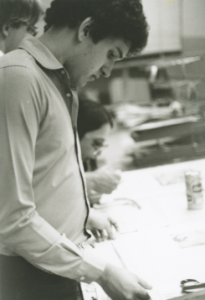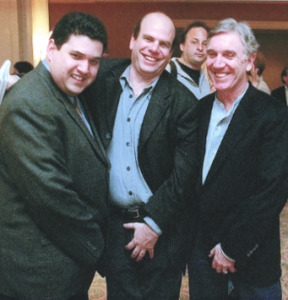Below is a list of charities and non-profits that we’ve sponsored in connection with television production in Baltimore and New Orleans. In the event that anything that we’ve worked on for HBO or in prose has found any favor and left anyone ready to unass a few dollars for a tax-deductible cause, it’s probable that something on the list will directly address an issue, locale or dynamic that we dramatized.
Treme
HBO
2010-2012
In keeping with the theme of Treme, HBO and Blown Deadline Productions have specifically targeted non-profits that service the culture of New Orleans. These are organizations that directly assist musicians and culture-bearers, or expand the reach of musical education within the city.
The New Orleans Musician’s Clinic
The New Orleans Musicians’ Clinic (NOMC) is a not-for-profit healthcare facility that provides medical and social services to local musicians and culture-bearers, such as members of the Mardi Gras Indian or Social Aid & Pleasure Club communities. NOMC was founded in 1998 to address the unmet health needs of the local artist community. Ninety percent of the clinic’s client base lives at or below our nation’s poverty level, unable to access healthcare through traditional means. Currently, NOMC is the only clinic of its kind in the nation. Through partnerships with a variety of local medical organizations including LSU Healthcare Network and Tulane Medical School, NOMC provides comprehensive primary health care to over 2,000 patients citywide. The distinctive cultural and artistic heritage of New Orleans is alive today because of local artists, but without access to proper care, their work cannot be sustained. We’ve raised money for the clinic during all three filming seasons of Treme and regard it as one of our primary charities.
For more information, please visit: www.nomaf.org
The Roots of Music
The Roots of Music (ROM) is a not-for-profit organization that provides local youth with an escape from violence, instability and chaos, while enriching their lives with music, and possibly preparing them for a career in music. Since Hurricane Katrina, many schools have reduced or cut their music programs and marching bands and ROM fills this void, providing over 100 students with music education in history, theory, instrumental instruction and ensemble performance, all free of charge to the youth that participate. The program strives to give a better alternative to the street life culture and to bring students from all parts of the city together. With music being a huge part of the New Orleans community and by encouraging these young musicians, ROM is continuing to build the culture that so many have come to love in New Orleans. ROM recently received an invitation to perform in the 2013 Rose Bowl parade in Pasadena, California; the youngest marching group from Louisiana ever offered such an honor.
For more information, please visit: www.therootsofmusic.com
The Wire, The Corner
HBO
1999-2008
During the decade that HBO was producing television drama in Baltimore in conjunction with Blown Deadline Productions, we became the principal sponsor of one charitable fund and a supporter of several others. Above all, we directed much of our efforts to funding the Ella Thompson Fund of the Parks & People Foundation of Baltimore, and the history of that fund and our involvement in it is rooted in the reporting of the non-fiction narrative the Corner, published in 1997 by Broadway Books and later filmed as an HBO miniseries that aired in 2000.
The Ella Thompson Fund
As one of those whose lives was depicted in The Corner, Ella Thompson was one of the most extraordinary people that Ed Burns and I had the opportunity to meet along Fayette Street. Having lost a young daughter to street violence in 1988, Ella did not withdraw from her beleagured neighborhood but instead recommited her life to the children of Franklin Square, where she ran the rec center on Vincent Street for nearly a decade.
As our book was nearing publication, Ella asked if anything could be done to channel any interest in the book into the lives of children in her neighborhood. It was a simple, open-ended question and it prompted us to make a promise: Going forward, we told Ella, our speaking fees would always be directed to a small fund that could be used to service the recreation center on Vincent Street. And when Ella took a new job at the Parks & People Foundation for Baltimore, which administered programming at several westside rec centers, we transferred the administration of that small fund to the Foundation.
In the beginning, before The Corner and The Wire became premium cable fare on HBO, our speaking fees were both occasional and modest, so that while the fund provided some discretionary assets to assist Ella in rec programming, it didn’t go much beyond that. Over time, however, speaking engagements and the fees associated with such — as well as fundraising events held during the production of the HBO dramas in Baltimore — have nourished the Ella Thompson Fund with about three quarters of a million dollars and afforded us the opportunity to fund and support continuing rec programming on the west side.
If at any point, you end up hiring us for a speaking engagement, whether at a college, a business or any private group, you can be assured that the fees will find their way to this charity. That promise will continue to be honored, though Ella died more than a decade ago, suddenly, leaving an empty place in the lives of many in that neighborhood. But the fund that bears her name continues to do the work that she believed in deeply.
For More information, please visit: http://www.parksandpeople.org/support/the-ella-thompson-fund/
And for speaking engagements by David Simon or Ed Burns contact Peter Jacobs or Amie Yavor at Creative Artists Agency, 310-288-4545.
The Baltimore Station
The Baltimore Station Provides rigorous self-help programs in a safe, caring residential setting to support men, most of whom are veterans, who are transitioning from the cycle of poverty, substance abuse and homelessness to self-sufficiency. The station is a place where men find the structure and living environment that speaks to their needs. Most of the counseling staff are veterans, which provides them with the knowledge and experience to serve the special needs of homeless vets who often use drugs to “quiet” the effects of Post Traumatic Stress Disorder (PTSD). Residents include veterans from Vietnam and the Gulf War, and they are now beginning to see vets from Iraq and Afghanistan. Located in South Baltimore in a restored city firehouse, the station was a transitional point for George “Blue” Epps, one of the lives chronicled in The Corner and a former addict who used the programming and residency at Baltimore Station to achieve sobriety and become, eventually, a committed and effective substance-abuse counselor.
For more information, please visit: http://www.baltimorestation.org/
Memorial Scholarships
Two of those responsible for The Corner, The Wire or Treme died unexpectedly during the filming and production of those projects. Both were dear friends. Both are remembered through the establishment and maintenance of college scholarships in their name.
 David E. Mills Memorial Scholarship
David E. Mills Memorial Scholarship
A friend since our days working on the college newspaper at the University of Maryland’s College Park campus, David E. Mills was an extraordinary writer with a passion for his craft. A newspaper veteran who reported for the Wall Street Journal, the Washington Times and the Washington Post, Mills gravitated to television two decades ago. He wrote for dramas as varied as Homicide, NYPD Blue, ER, The Wire and Treme. He executive produced his own NBC miniseries, Kingpin, and won Emmy awards for cowriting The Corner miniseries.
David died suddenly on the set of Treme on March 30, 2010 from a brain aneurysm. To preserve David’s memory, HBO, Blown Deadline, family and friends have established and endowed a scholarship in his name that honors a time that David always insisted was among the most creative and enjoyable of his life. The David E. Mills scholarship is awarded annually to encourage an undergraduate writer and to specifically foster participation on the staff of the University of Maryland Diamondback, the daily campus newspaper at College Park.
For more information, please visit: http://davidemills.umd.edu/
Robert F. Colesberry Scholarship Fund
Bob Colesberry was a producer for more than two decades, and helped create such varied films as Mississippi Burning, After Hours and 61*. He worked arm-in-arm with some of the industry’s best regarded directors, including Martin Scorsese, Alan Parker, Ang Lee and Robert Benton.
As the executive producer of The Corner, a true-life depiction of urban drug addiction, he was honored with a Peabody Award and an Emmy for best miniseries, and it was through his work on that project that he became tethered to Blown Deadline Productions and HBO on other developing projects, notably The Wire. A talented film craftsman and storyteller, Colesberry created the visual templates for both projects, until his untimely death in surgery just before the third season of The Wire.
In his honor, HBO, Blown Deadline Productions, family and friends created the Robert F. Colesberry Scholarship Fund at the Tisch School of New York University, Colesberry’s alma mater. The scholarship, awarded annually, supports young filmmakers seeking to carry on a tradition of filmic professionalism and excellence.
Contributions to the Colesberry scholarship can be made in care of the Tisch School for the Arts, in care of New York University, 721 Broadway, 12th Floor, New York, N.Y. 10003. For more information on Colesberry, please visit: http://www.hbo.com/the-wire/cast-and-crew/robert-f-colesberry/article/remembering-bob-colesberry.html



